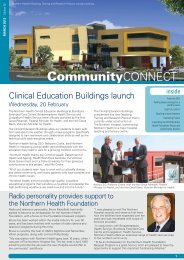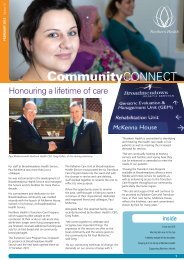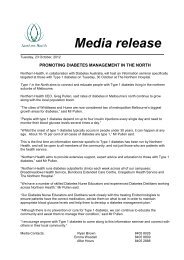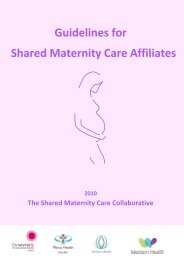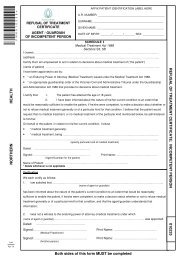Research Week Abstract Book - Northern Health
Research Week Abstract Book - Northern Health
Research Week Abstract Book - Northern Health
You also want an ePaper? Increase the reach of your titles
YUMPU automatically turns print PDFs into web optimized ePapers that Google loves.
Chronic Disease Management<br />
APProPriaTE OR NOT? A SURVEY OF ANTIMICrobial PresCribinG AT THE<br />
NORThern HOSPITal<br />
Chhanabhai A 1 , Hume S 2 , Jeremiah C 2 , Yeung L 1 .<br />
1<br />
Pharmacy Department, <strong>Northern</strong> <strong>Health</strong><br />
CHROnIC DISEASE Management<br />
2<br />
Department of Medicine, <strong>Northern</strong> <strong>Health</strong><br />
Background<br />
Antimicrobial resistance is a growing problem globally, and is compounded by a lack of new antimicrobials in the drug<br />
development pipeline. There is good evidence that regional antimicrobial resistance rates correlate with corresponding<br />
regional antimicrobial consumption. Up to 50% of antimicrobials used in hospitals in Australia and overseas are considered<br />
inappropriate and are associated with adverse patient outcomes, while also driving resistance.<br />
Aim<br />
To conduct a baseline survey of antimicrobial prescribing trends at The <strong>Northern</strong> Hospital (TNH) and identify areas that could<br />
be targeted for quality improvement through <strong>Northern</strong> <strong>Health</strong>’s antimicrobial stewardship program.<br />
Methodology<br />
Two teams, each consisting of an infectious diseases physician and a pharmacist, reviewed the charts of randomly selected<br />
inpatients throughout TNH. When the patient was prescribed an antimicrobial, the team reviewed the patient’s notes and<br />
pathology investigations and assessed the appropriateness of the antimicrobial. Where possible, the Australian Therapeutic<br />
Guidelines: Antibiotic Version 14 was used as the reference standard.<br />
Results<br />
Thirty of 80 (37.5%) patients surveyed were on at least one antimicrobial. The indication for the antimicrobial was documented<br />
in 24 (80%) patients. In thirteen patients (43.3%), the prescribed antimicrobial was considered inappropriate. Categories of<br />
inappropriate antimicrobial prescribing included: antimicrobials not indicated, inappropriately broad-spectrum antimicrobials<br />
and extension of surgical prophylaxis beyond 24 hours.<br />
Conclusion<br />
The results show there are a number of areas in which the prescribing of antimicrobials can be improved to optimise patient<br />
outcomes while minimising unintended consequences of antimicrobial use. These areas will provide targets for future<br />
antimicrobial stewardship activities within the hospital.<br />
21



